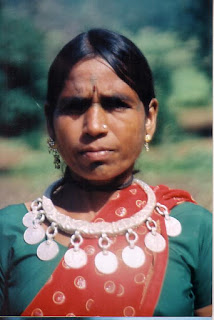With the passage of time, however, it looks as if Bhil women have finally begun aspiring to be Kansaris in their own right. For instance this middle aged lady of no letters below from Vakner village in Jhabua district (photographed by my friend Narendra Patil when he paid a visit to her home a month or so ago) has never set foot farther than the weekly market about ten kilometers from her residence and so has obviously been under the rule of her husband.

But her daughter below (again photographed by Narendra) not only has studied upto class five but also seasonally migrates as far as three hundred kilometers away deep inside Gujarat to work as a construction labour and earn heaps of money by the standards of Jhabua. She may be in more or less the same dress as her mother but she has powder on her face and lipstick on her lips. When she goes to Gujarat she dresses differently like the women in that state do. Young women like her are not as subservient to their husbands as their mothers were because they earn money, they can read and write, they can travel far and wide and most importantly they can control the number of babies that they want to bear. Believe it or not the I-pill has penetrated into these jungles thanks to migration to Gujarat.

The other major factor that has changed power equations between the sexes in Bhil coutry is the reservation of seats for women in the village, block and district level local governments under Panchayati Raj. Though initially there was the phenomenon of Sarpanch patis wherein the husbands of the elected women representatives used to officiate on their behalf with time things have changed and more and more Bhil women panches and sarpanches have begun exercising their authority.
But the veil refuses to be lifted. It is indeed a mystery as to how the Bhil women picked up the retrograde Hindu custom of veiling themselves in front of male elders on their husband's side but this has proved to be a very resilient one. In the villages especially this custom continues and despite all the influences from outside it is refusing to fade away. The felicitation of Kansari has definitely taken on more real meaning for the Bhil women but there are still many more hurdles to be crossed.
No comments:
Post a Comment